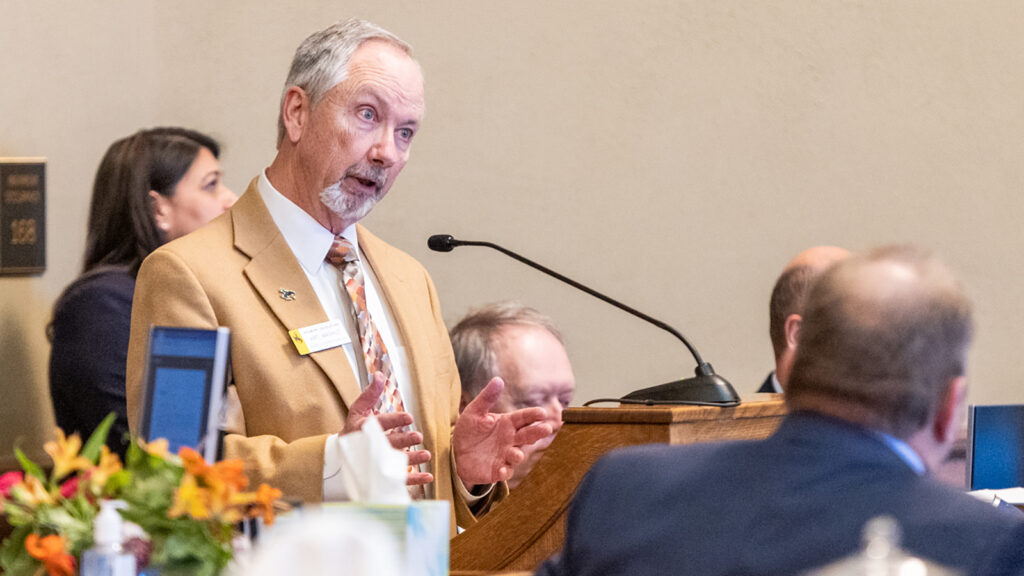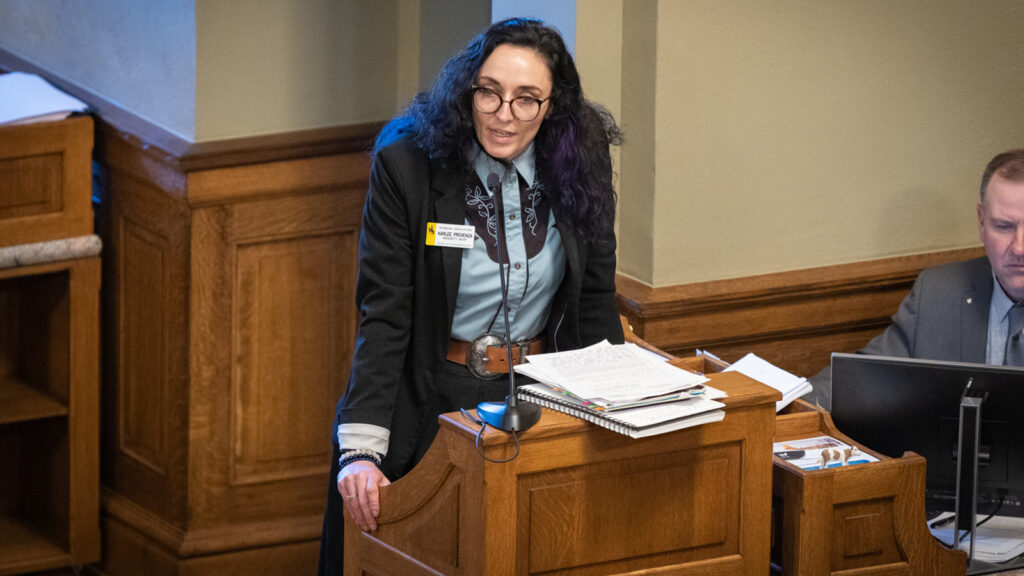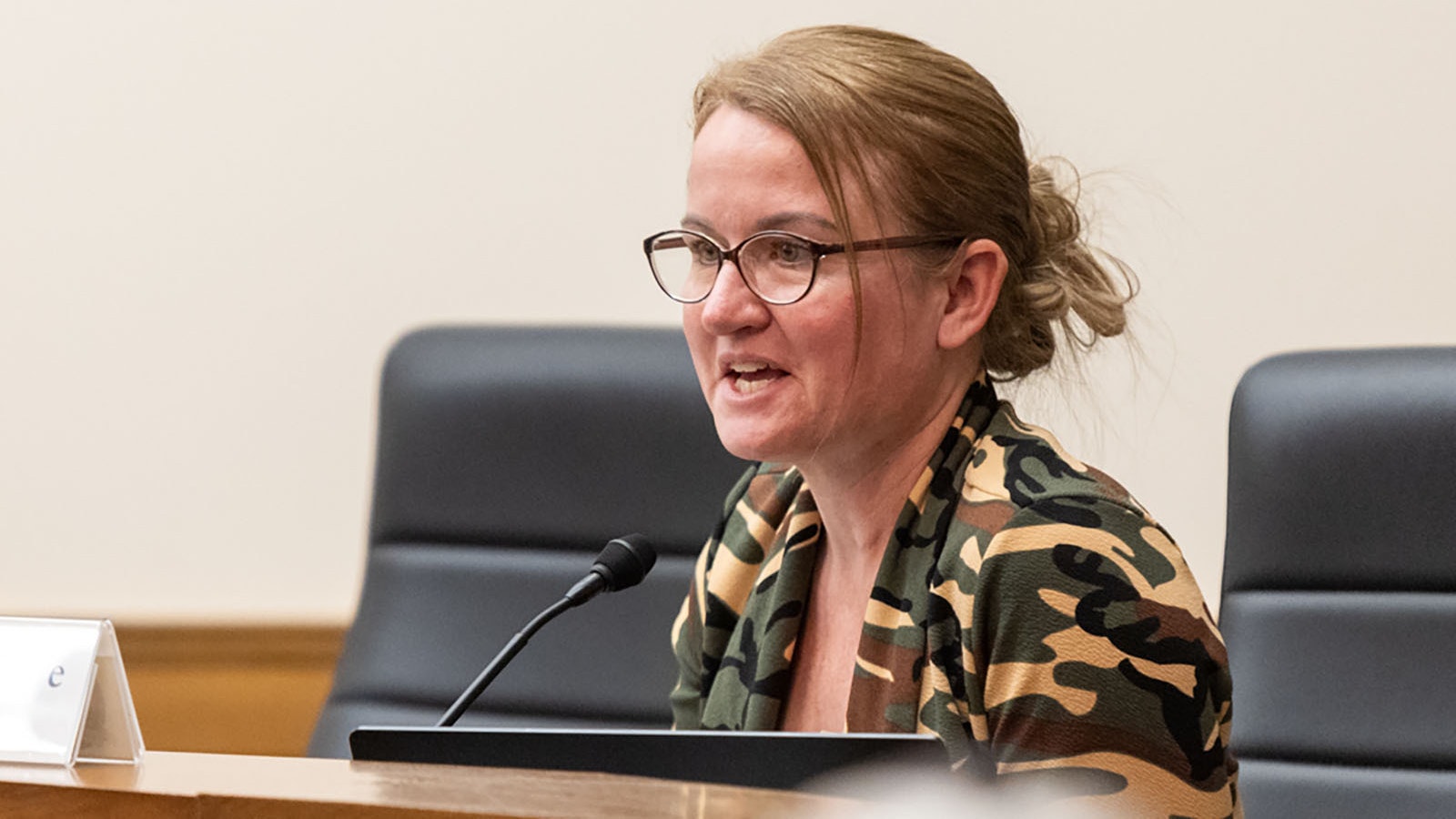Separating loyalty to one’s assigned state House or Senate committee from independence as a legislator is a complicated balancing act for many members of the Wyoming State Legislature.
This seems to have come to a bubbling point during an impromptu meeting held by the House Judiciary Committee this week, when an encounter between Joint Judiciary Committee Chairman Rep. Art Washut, R-Casper, and member Rep. Mark Jennings, R-Sheridan, became confrontational, Jennings said.
Jennings said the conflict was the result of his refusal to vote for Senate File 56, a bill created by the Joint Judiciary Committee during the interim session that would give Wyoming game wardens authority to ticket trespassers.
Jennings voted against the bill in what would be a critical vote in the committee failing it 5-4. The legislation had already passed through the Senate on a 25-6 vote.
After the failure of SF 56, a bill sponsored by the joint committee itself, Jennings said Washut told the committee members that it’s their job to shepherd their own bills to the House floor and he wanted to be informed ahead of time if a member planned to vote against a committee-sponsored bill.
Washut said there were members of the Senate and public surprised that the trespassing bill didn’t pass the committee.
“There were lots of stakeholders who participated over the interim, both elected members, community members, different folks of people, who said, ‘What happened to that bill?’” Washut told Cowboy State Daily. “It was a committee bill, why did it die in your committee?”

Rep. Art Washut, Joint Judiciary Committee chairman
Not Beholden To Committee
Jennings said that when confronted, he told Washut the he doesn’t work for the committee, but rather “10,000 people back home.”
“I’m not giving you former notice how I’m voting. I think that’s just wrong,” Jennings said. “And (No.) 2, we don’t work lockstep, we work for the constituents.”
Jennings said Washut responded that he might see about having Jennings removed from the committee.
Jennings also said he couldn’t recall an impromptu meeting like the one held after the SF 56 incident being called during his eight years in the Legislature.
“It’s not normal,” he said.
There was no public notice given for the impromptu meeting that Jennings said lasted for five to 10 minutes.
Washut declined to comment to Cowboy State Daily about the nature of the meeting but said it was casual in nature. Multiple other lawmakers CSD spoke to backed up Washut’s characterization of the meeting.
What The Rules Say
Under the Wyoming Open Meetings law, when a quorum of a governing body is present, public notice must be given.
An agency may hold an emergency meeting on matters of serious immediate concern to take temporary action without notice, but reasonable effort shall be made to offer public notice. Washut did not call an executive session during the meeting about the game warden trespass bill, but told at least one member of the public to leave.
Committee member Rep. Tony Niemiec, R-Green River, has a slightly different perception of what happened.
He said Washut started the meeting by apologizing for some of the dysfunction of the new legislative session. Then, he encouraged the members to try and get committee bills to the floor.
“He said, ‘I’m not telling you how to vote, but if there’s a potential that these things are going to get killed, then let me know,’” Niemiec said.

Rep. Mark Jennings, on changing his mind on Senate File 56 and voting no on it
Can He Do That?
Jennings believes he retains a right and responsibility to vote against any piece of legislation if he so chooses. Listening to testimony and evidence presented during committee meetings can, if a lawmaker has an open mind, sway how he votes.
“Maybe you go in with a preconceived notion that you’re going to vote ‘yes’ and then you listen to the testimony and vote ‘no,’” he said.
Jennings said Washut confronted him after the vote. When Jennings defended his vote against the committee bill, he claims Washut threatened that he could have him removed from the committee.
This action would actually have to come from House Speaker Rep. Albert Sommers, R-Pinedale. Although Sommers told Cowboy State Daily he’s not considering removing anyone from any committees he assigns legislators to, he said he does have the right to do so.
“I can do it whenever I please,” he said. “That was what was determined after talking with the lawyers with LSO (Legislative Service Office).”
It’s not explicitly delineated in House rules that the speaker has this power, but the position does have responsibility to assign committees at the beginning of the session and may fill vacancies on committees during the interim when the Legislature isn’t in session. A speaker also could move members from one committee to another before the start of the interim.
This is in contrast to the Senate, where a majority vote is needed from the body to remove any member from a committee post.
Committee Bills
Senate File 56 is a Joint Judiciary Committee bill, which is a piece of legislation that has been crafted by a particular committee during the course of the interim session.
These bills can be the result of more than five meetings and sometimes involve thousands of dollars in employee wages paid to LSO staff who help craft and research the bills. These interim meetings also tend to involve more public testimony as more time is generally available.
“Committee bills are so important, and that’s based on the predication that we have these looming, huge issues out there that do take study and time,” said former state legislator Tyler Lindholm. “And it’s nothing against an individual legislator, but a lot of individual legislators do not take the time and effort to put into their legislation to handle things and properly research them.”
Lindholm also mentioned how many bills require a very specific criteria of knowledge that few lawmakers possess. This is where engagement from the public can be incredibly valuable.
Still, many committee bills die long before making it to the full legislative session.
“So, the ones that make it through the interim that are given to us to continue to work to try and get out on the floor, we’re just killing them,” Niemiec said. “So, we wasted the time of the LSO, we wasted the time of those former committee people that were on that committee.
“We have to take a look at what they were thinking. Maybe it was a bad bill, but it could be worked out in the houses to make it a good bill.”
Loyalty
The confrontation over the Judiciary Committee’s denial of SF 56 highlights another underlying theme at the Legislature: how loyal should lawmakers be to advancing their committee bills vs. voting their conscience.
Washut told Cowboy State Daily there should be some loyalty given to seeing a bill reach the body as a whole.
“We’ve invested the time into that topic,” he said. “We worked the bill extensively, asked the public to travel across the state and attend our meetings, participate in our discussion. The default probably ought to be that.”
He said there are certain circumstances where this wouldn’t hold, through, mentioning one recent bill where new information came to light during the session.
Lindholm said there should be a sense of teamwork when advancing committee bills as long as they don’t negatively affect a legislator’s community.
“It’s kind of a team effort,” he said. “This is something that is your bread and water that you worked all summer and worked with agency on.”
Many of the House bills passed through committees this session remained in Hulett Republican Majority Floor Leader Chip Neiman’s drawer through the last deadline, never to be considered again. Past leaders tended to kill bills before they ever went to committees.

Rep. Karlee Provenza, Joint Judiciary Committee member
It Takes Balance
Rep. Karlee Provenza, D-Laramie, who also voted against SF 96, said she’s undecided on the issue. She agrees with Jennings that one amendment could completely change the nature of a bill, but also worries about wasting months of effort spent in committee. Many interim committee meetings are held for two full days at a time.
“If we kill committee bills, why do we even have interim sessions?” she questioned. “There’s a lot of effort spent to do the committee meetings.”
Provenza believes a larger issue is a decline of respect in the House.
She said that in the past, no matter what party someone was part of, they could usually expect respect from another lawmaker in trying to get a bill passed. Now, she’s not so sure if that standard still exists as she believes some members oppose bills purely because of who sponsors them.
Rep. Clark Stith, R-Rock Springs, believes certain committees are more or less supportive of their own bills. A former Judiciary Committee member, Stith said this committee tends to have less loyalty to bills.
The Appropriations Committee, of which Stith is a member now, is usually very loyal to its bills because of the extensive budgeting work that takes place with them, he said.
“I think people, we’re all duly elected, we’re all sent down here to represent our constituents,” he said. “When I’m voting, I’m thinking about the values that are involved in a bill. Do I promote these values, and does it help my constituency, does it help my community, and does it help the state?”
But he also said he has been asked to present bills on the floor he disagreed with in committee. Stith mentioned a recent bill he presented to the House that he ended up voting against shortly after.
Sommers said all loyalty can go out the window once a bill reaches the floor as long as members tell the committee chairman how they plan to vote.
“When I came in … that was kind of the protocol,” he said. “Common courtesy.”
New Committee, New Focus
After November elections, some committees may look completely different heading into the new session then they did just a few months prior. Take the House Corporations, Elections and Political Subdivisions Committee, which returned only one of its former nine members for the 2023 session.
“Having a little confidence in your fellow legislators who brought those bills out of the interim,” Washut said. “I’m maybe not going to vote for this on the floor, but let it be heard.”
Jennings was not a member of the 2022 interim committee that created SF 56. Neither was Rep. Jeremy Haroldson, R-Wheatland, who also voted against the bill.
“I had no one from my community go, ‘We need this,’ and I had many from my community saying, ‘Oh, we don’t need this,’” Haroldson said of his initial vote.
On Friday, Haroldson said he had a change of heart about SF 56 and made a motion to bring it back before the Judiciary Committee.
“One of the biggest struggles we have as a Legislature is public perception,” Haroldson said. “If people don’t understand a bill, they’ll crucify you on it, no matter what.”
After being brought back for another consideration later in the week, SF 56 passed 7-1. Jennings once again voted no.
“I think it was good that it came back,” Washut said. “Whether it sinks or swims on the floor is up to the body.”





